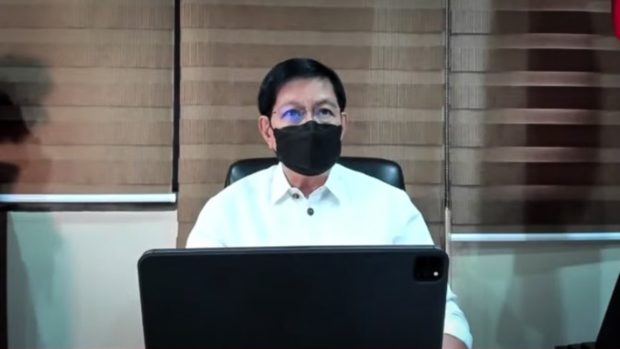
Sen. Panfilo “Ping” Lacson. Screen grab/Senate PRIB file photo
MANILA, Philippines — The Department of Public Works and Highways’ (DPWH) compliance with the order to devolve certain functions and funds to local government units for next year is only good on paper, Senator Panfilo Lacson.
According to Lacson, due to the devolution order, funds for local programs of the DPWH are expected to have a decline as these will instead be handled by the LGUs.
While the proposed 2022 budget of the DPWH shows an 89 percent decline in the funds for local programs, Lacson pointed out that the budget for the Convergence and Special Support Program (CSSP) had a 232 percent increase.
“While 89 percent ang nawala sa Local Program, nag-increase ang Convergence and Special Support Program by 232 percent,” Lacson said.
“So they are just complying on paper, but in reality, they are not complying. That’s my point,” he added.
Lacson’s data shows that the proposed budget for local programs dipped from P280.6 billion in 2021 to P31.2 billion for next year.
However, the proposed budget for the CSSP increased from P62.1 billion in 2021 to P206.5 billion in 2022.
Moreover, Lacson pointed out that the budget item “Various Infrastructure Including Local Projects” (VILPs), which was included in the 2021 budget of the DPWH, was no longer present in the 2022 proposal.
However, Lacson said that projects of the same nature are instead lodged under the CSSP.
“On its face, the DPWH budget proposal seems to be compliant but upon closer scrutiny, this may not seem to be so,” Lacson said.
DPWH Undersecretary Maria Catalina Cabral explained that under the executive order on the devolution of functions and funds to LGUs, it is stated that public services with significant inter-jurisdictional externalities are best assigned to higher levels of government.
“Our program on the convergence manifests all of this like we have significant inter-jurisdictional externalities, for example, our tourism road projects that will cover multiple municipalities or local government units, supporting industries with high multiplier effects like agribusiness tourism,” Cabral said.
“We communicated this to the Department of Budget and Management to justify the convergence program, particularly those that will support the Philippine economy in terms of various industries like tourism, agribusiness, local industries and our local infrastructure program that are part of our national expenditure program manifests inter-jurisdictional externalities,” she added.
RELATED STORY:
Gov’t to transfer some functions to LGUs

